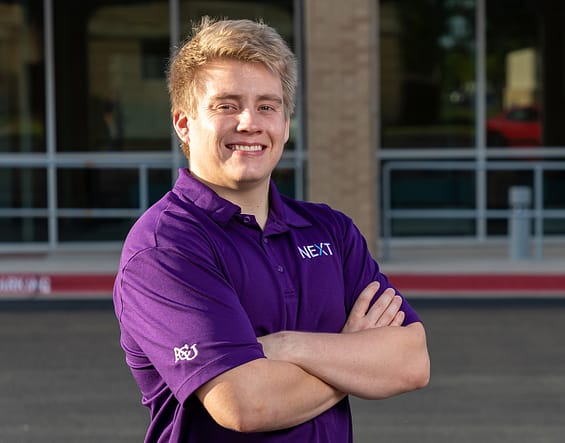
When Keaton Brewster graduates in May with a degree in physics and mathematics, he’ll be taking with him more than a diploma.
A research proposal stemming from his work in ACU’s NEXT Lab has earned him a prestigious fellowship from the National Science Foundation’s Graduate Research Fellowships Program. With his annual stipend of $34,000, Keaton plans to attend Colorado School of Mines in the fall and work toward his Ph.D. in mechanical engineering.
While at ACU, Keaton has engaged in groundbreaking research alongside faculty and staff in the Nuclear Energy eXperimental Testing (NEXT) Lab, which is looking to build the first university-based molten salt research reactor at ACU.
Molten salt reactors have the potential to solve some of the world’s most pressing problems, including safer, cleaner and less expensive energy, pure and abundant water and medical isotopes for diagnosing and treating cancer.
Keaton was instrumental in development of a prototype of the first patented invention by NEXT, a high-temperature flow meter to help monitor the flow of molten salt through a pipe at temperatures as high as 700 degrees Celsius.
His research proposal for graduate school is “Optimizing Cold Tank Levels for Molten Salt Thermal Energy Storage Systems.”
“NEXT is working on developing molten salt reactors, but molten salt has many applications beyond reactors, so this is an extension of NEXT,” Keaton said.
“For example, concentrated solar power plants superheat tanks of salt during the day, and then are able to supply energy 24/7,” he explained. “Without this storage method, they would only be able to supply power when the sun is out. My proposal is to study ways to optimize the use of molten salt as a thermal energy storage method for concentrated solar power and other renewable energy sources.”
Dr. Timothy Head, department chair and professor of engineering and physics, says Keaton has been a leader in the department since he arrived at ACU.
“He is an excellent student academically but beyond that he is a wonderful person. I can’t think of anyone more deserving of the NSF Graduate Research Fellowship,” Head said. “The competition for this award is very high, and it is one of the most prestigious awards in the country, giving the best students a chance to focus on research ideas that can change the world.”
Students like Keaton are certainly on track to change the world. Keaton’s research stems from his interest in environmental issues and a desire to make the planet a better place to live.
“I have always enjoyed the outdoors but have seen a dramatic impact from humans on the environment, so I want to help find ways to minimize our impact,” he said. “Also, we have been dependent on fossil fuel energy for many years, and it is time we move to something that is cheaper, more efficient and more sustainable like molten salt reactors or renewable sources.”
– Robin Saylor
Apr. 21, 2021
